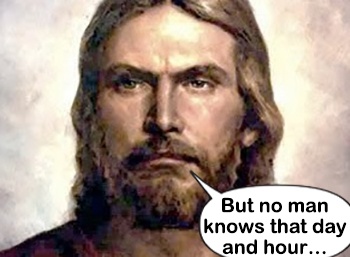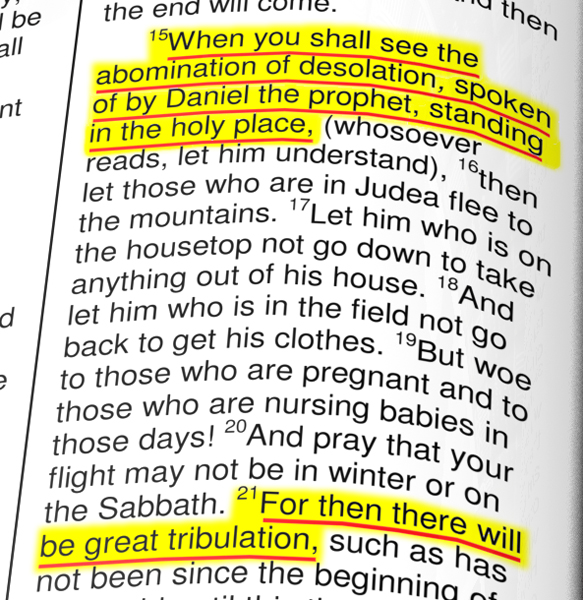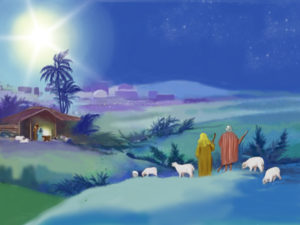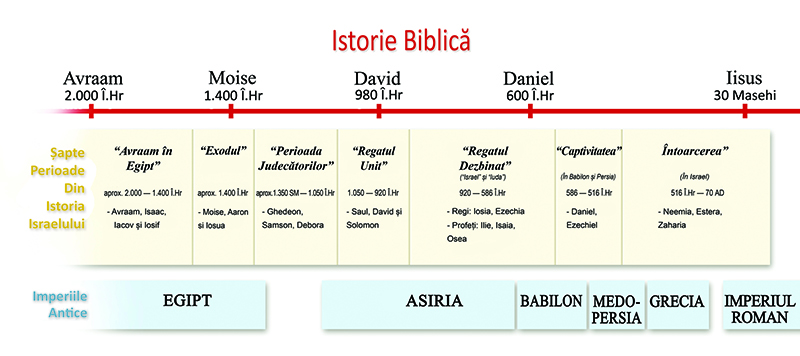
Last Sunday I shared a class on Daniel chapter 10 with an adult Sunday school group I attend in Austin, Texas. I made an audio recording of the class and an edited 35 minute version of it can be heard here. In the class we have been going through the prophets in the Old Testament and they wanted me to do the prophetic chapters in Daniel. We completed the prophetic chapters through Daniel 9 and the Sunday before we watched the video I did in 2014 on Daniel 9:27. As some of you know, Daniel 9:27 is one of the most important verses in the whole book of Daniel and, perhaps it could be said, in the whole Old Testament.
I’ve often shared in my video classes what Jesus said in Matthew 24 when He was asked about His return. One of the most pivotal verses in the chapter is Matthew 24:15 where Jesus said, “When you therefore shall see the abomination of desolation, spoken of by Daniel the prophet, standing in the holy place, whoso reads, let him understand.”
One of the most pivotal verses in the chapter is Matthew 24:15 where Jesus said, “When you therefore shall see the abomination of desolation, spoken of by Daniel the prophet, standing in the holy place, whoso reads, let him understand.”
And He went on to say in verse 21 that “For then shall be great tribulation, such as was not since the beginning of the world”. But what exactly is Jesus referring to there in Matthew 24 that we should read in the book of Daniel? It seems this is not too often spoken about or pursued, even though the Lord put so much emphasis on it.
The video on Daniel 9:27 explains about this a good deal. But specifically, the clearest verse on this is found in Daniel 11. And as we found in our class on Daniel 10 last Sunday, the last 3 chapters in Daniel, 10, 11 & 12, seem to be all one event, unlike the first 9 chapters. The narrative flows from one chapter to the next in these last three. It seems that since it was all so much longer than the other narratives, the people back in the 1600’s or 1500’s who divided the Bible up into chapters and verses made this section into 3 chapters.
Actually, this is not specifically a prophetic chapter. But Daniel chapter 10 sets the stage for the archangel Michael’s message to Daniel in chapters 11 and 12. And it contains one of the most amazing glimpses in the Bible into the spiritual world and the battles going on there between the angels of God and the demons of hell.
Daniel tells us that he had been fasting for 21 days. In the class we took note of the fact that almost certainly Daniel was well into his 80’s by this time.  Then appeared to him an angel in all his glory to speak to him and bring a message to him about the future. It doesn’t say definitively who this angel is but my thought has always been that this was Gabriel, as he was the angel coming to Daniel in earlier chapters.
Then appeared to him an angel in all his glory to speak to him and bring a message to him about the future. It doesn’t say definitively who this angel is but my thought has always been that this was Gabriel, as he was the angel coming to Daniel in earlier chapters.
But then the angel explains that he had been hindered in answering Daniel’s prayer because “the prince of Persia withstood me 21 days. But then Michael, one of the chief princes, came to help me.” (Daniel 10:13) What an incredible flash of revelation into the behind-the-scenes workings of the spiritual world. A demon prince had fought against this angel getting his message through to Daniel until Michael, the archangel, came and intervened to turn the tide to the favor of the Lord’s will and His servant, Daniel.
It’s just an incredible chapter and vividly visual. Hopefully someday I can make a video of this one and continue the prophecies of Daniel video series. Meanwhile, here’s the link to the 35 minute audio of the class we had on Daniel 10 last Sunday. I hope it’s a blessing to you.
Your friend, Mark








 To build a house, you’d start out with the foundation, then the framework, the walls and last would be the finishing touches. Jesus Himself pointed His disciples to the Book of Daniel and told them, “
To build a house, you’d start out with the foundation, then the framework, the walls and last would be the finishing touches. Jesus Himself pointed His disciples to the Book of Daniel and told them, “ To paraphrase Paul, I believe God is the “
To paraphrase Paul, I believe God is the “ It all fits wonderfully together, both the information God gave in the Old Testament, primarily through the prophet Daniel, then what Jesus taught about the matter in Matthew 24 and the places Paul talked about the subject, like in II Thessalonians. There are other places as well but I’m just hitting the highlights here. All these things are the building that was done by God through the Scriptures, “
It all fits wonderfully together, both the information God gave in the Old Testament, primarily through the prophet Daniel, then what Jesus taught about the matter in Matthew 24 and the places Paul talked about the subject, like in II Thessalonians. There are other places as well but I’m just hitting the highlights here. All these things are the building that was done by God through the Scriptures, “
 Peter vehemently refused saying, “
Peter vehemently refused saying, “ Even though he was a man of God, Jonah must have had some major things in his heart, “lying vanities”, which kept him away from the mercy of God. Until it seemed utterly too late. But it wasn’t. There in the whale’s belly Jonah said, “
Even though he was a man of God, Jonah must have had some major things in his heart, “lying vanities”, which kept him away from the mercy of God. Until it seemed utterly too late. But it wasn’t. There in the whale’s belly Jonah said, “ Jonah then went to Nineveh and declared God’s message, “
Jonah then went to Nineveh and declared God’s message, “
 It takes time for some people, many people, to really realize how things are. Sometimes it takes a lifetime. And that’s difficult for us who pray for them, love them and watch as they seem to be wasting their life away. The prodigal son, at length, “
It takes time for some people, many people, to really realize how things are. Sometimes it takes a lifetime. And that’s difficult for us who pray for them, love them and watch as they seem to be wasting their life away. The prodigal son, at length, “ Only thing is, sometimes that doesn’t even seem to happen in this life. Ones in the Old Testament from Job to Jeremiah questioned the Lord about why He seemed at times to allow the sinful and Godless to live out their lives and not suffer for their evil. Jeremiah prayed, “
Only thing is, sometimes that doesn’t even seem to happen in this life. Ones in the Old Testament from Job to Jeremiah questioned the Lord about why He seemed at times to allow the sinful and Godless to live out their lives and not suffer for their evil. Jeremiah prayed, “ Another parable He put forth unto them, saying, “The kingdom of heaven is like to a man which sowed good seed in his field. But while men slept, his enemy came and sowed tares among the wheat and went his way. But when the blade was sprung up and brought forth fruit, then appeared the tares also. So the servants of the householder came and said unto him, ‘Sir, did you not sow good seed in your field? From where then does it have tares?’ He said unto them, ‘An enemy has done this.’ The servants said unto him, ‘Will you then that we go and gather them up?’ But he said, ‘No, because while you gather up the tares, you may root up also the wheat with them. Let both grow together until the harvest. And in the time of harvest I will say to the reapers, ‘Gather together first the tares, and bind them in bundles to burn them. But gather the wheat into my barn.’”
Another parable He put forth unto them, saying, “The kingdom of heaven is like to a man which sowed good seed in his field. But while men slept, his enemy came and sowed tares among the wheat and went his way. But when the blade was sprung up and brought forth fruit, then appeared the tares also. So the servants of the householder came and said unto him, ‘Sir, did you not sow good seed in your field? From where then does it have tares?’ He said unto them, ‘An enemy has done this.’ The servants said unto him, ‘Will you then that we go and gather them up?’ But he said, ‘No, because while you gather up the tares, you may root up also the wheat with them. Let both grow together until the harvest. And in the time of harvest I will say to the reapers, ‘Gather together first the tares, and bind them in bundles to burn them. But gather the wheat into my barn.’” But the tares are the children of the wicked one and the enemy that sowed them is the devil. The harvest is the end of the world and the reapers are the angels. As therefore the tares are gathered and burned in the fire, so shall it be in the end of this world. The Son of man shall send forth His angels and they shall gather out of His kingdom all things that offend and them which do iniquity and shall cast them into a furnace of fire. There shall be wailing and gnashing of teeth. Then shall the righteous shine forth as the sun in the kingdom of their Father. Those who have ears to hear, let them hear.”
But the tares are the children of the wicked one and the enemy that sowed them is the devil. The harvest is the end of the world and the reapers are the angels. As therefore the tares are gathered and burned in the fire, so shall it be in the end of this world. The Son of man shall send forth His angels and they shall gather out of His kingdom all things that offend and them which do iniquity and shall cast them into a furnace of fire. There shall be wailing and gnashing of teeth. Then shall the righteous shine forth as the sun in the kingdom of their Father. Those who have ears to hear, let them hear.” But through God’s incredible, undeserved mercy, I somehow “came to myself” and joined the wheat. I personally was very nearly at “the harvest”. The Grim Reaper was before me, literally, and my life was hanging by the barest thread when I finally “figured it out” and turned to the God of Abraham.
But through God’s incredible, undeserved mercy, I somehow “came to myself” and joined the wheat. I personally was very nearly at “the harvest”. The Grim Reaper was before me, literally, and my life was hanging by the barest thread when I finally “figured it out” and turned to the God of Abraham.
 All of this of course is exceedingly rich in symbolism and meaning. They entered the promised land “by faith”, just as we are to receive and believe for all that God has given us through the mighty saving grace of our dear Lord Jesus. We have entered into the true “Promised Land” of eternal life and blessings through Him. But, but… like God’s people of old, so very many of us have not
All of this of course is exceedingly rich in symbolism and meaning. They entered the promised land “by faith”, just as we are to receive and believe for all that God has given us through the mighty saving grace of our dear Lord Jesus. We have entered into the true “Promised Land” of eternal life and blessings through Him. But, but… like God’s people of old, so very many of us have not  Did you know that over 300 years after the Jews conquered the land, that what we now call Jerusalem was still inhabited by the Canaanites? David and his men climbed the mountains surrounding the city and routed the inhabitants, establishing Jerusalem as the new center and capital of ancient Israel. But that was centuries after the time of Joshua and the original conquering of the land.
Did you know that over 300 years after the Jews conquered the land, that what we now call Jerusalem was still inhabited by the Canaanites? David and his men climbed the mountains surrounding the city and routed the inhabitants, establishing Jerusalem as the new center and capital of ancient Israel. But that was centuries after the time of Joshua and the original conquering of the land. And of course we know that David not only scaled the heights and took the capital city physically, he did this spiritually as well. David probably went further than any other man in the Old Testament in really loving the Lord and, even as the sinner he was, in doing all he could to obey the Lord. It was David’s love for the Lord and obedience that catapulted Israel into the richest era in its history, not only physically in the coming kingdom of Solomon but spiritually in the lifetime of David and the treasures of spiritual riches he shared with his generation and all generations after that in the Psalms.
And of course we know that David not only scaled the heights and took the capital city physically, he did this spiritually as well. David probably went further than any other man in the Old Testament in really loving the Lord and, even as the sinner he was, in doing all he could to obey the Lord. It was David’s love for the Lord and obedience that catapulted Israel into the richest era in its history, not only physically in the coming kingdom of Solomon but spiritually in the lifetime of David and the treasures of spiritual riches he shared with his generation and all generations after that in the Psalms. The Bible says that “…
The Bible says that “…


















